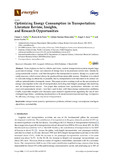Mostrar el registro sencillo del ítem
Optimizing energy consumption in transportation: literature review, insights, and research opportunities
| dc.creator | Corlu, Canan Gunes | es_ES |
| dc.creator | Torre, Rocío de la | es_ES |
| dc.creator | Serrano Hernández, Adrián | es_ES |
| dc.creator | Juan Pérez, Ángel Alejandro | es_ES |
| dc.creator | Faulín Fajardo, Javier | es_ES |
| dc.date.accessioned | 2020-07-03T12:54:14Z | |
| dc.date.available | 2020-07-03T12:54:14Z | |
| dc.date.issued | 2020 | |
| dc.identifier.issn | 1996-1073 | |
| dc.identifier.uri | https://hdl.handle.net/2454/37306 | |
| dc.description.abstract | From airplanes to electric vehicles and trains, modern transportation systems require large quantities of energy. These vast amounts of energy have to be produced somewhere—ideally by using sustainable sources—and then brought to the transportation system. Energy is a scarce and costly resource, which cannot always be produced from renewable sources. Therefore, it is critical to consume energy as efficiently as possible, that is, transportation activities need to be carried out with an optimal intake of energetic means. This paper reviews existing work on the optimization of energy consumption in the area of transportation, including road freight, passenger rail, maritime, and air transportation modes. The paper also analyzes how optimization methods—of both exact and approximate nature—have been used to deal with these energy-optimization problems. Finally, it provides insights and discusses open research opportunities regarding the use of new intelligent algorithms—combining metaheuristics with simulation and machine learning—to improve the efficiency of energy consumption in transportation. | en |
| dc.description.sponsorship | This work was partially supported by the Spanish Ministry of Science, Innovation, and Universities (RED2018-102642-T), and the following projects: IoF2020-H2020 (731884), La Caixa Foundation (LCF/PR/PR15/51100007), and AGAUR (2018-LLAV-00017). | en |
| dc.format.extent | 33 p. | |
| dc.format.mimetype | application/pdf | en |
| dc.language.iso | eng | en |
| dc.publisher | MDPI | en |
| dc.relation.ispartof | Energies, 2020, 13 (5), 1115 | en |
| dc.rights | © 2020 by the authors. Licensee MDPI, Basel, Switzerland. This article is an open access article distributed under the terms and conditions of the Creative Commons Attribution (CC BY) license. | en |
| dc.subject | Transportation systems | en |
| dc.subject | Optimization problems | en |
| dc.subject | Efficient energy consumption | en |
| dc.subject | Intelligent algorithms | en |
| dc.subject | Sustainability | en |
| dc.title | Optimizing energy consumption in transportation: literature review, insights, and research opportunities | en |
| dc.type | info:eu-repo/semantics/article | en |
| dc.type | Artículo / Artikulua | es |
| dc.contributor.department | Institute for Advanced Research in Business and Economics - INARBE | es_ES |
| dc.contributor.department | Institute of Smart Cities - ISC | es_ES |
| dc.rights.accessRights | info:eu-repo/semantics/openAccess | en |
| dc.rights.accessRights | Acceso abierto / Sarbide irekia | es |
| dc.identifier.doi | 10.3390/en13051115 | |
| dc.relation.projectID | info:eu-repo/grantAgreement/European Commission/Horizon 2020 Framework Programme/731884 | en |
| dc.relation.publisherversion | https://doi.org/10.3390/en13051115 | |
| dc.type.version | info:eu-repo/semantics/publishedVersion | en |
| dc.type.version | Versión publicada / Argitaratu den bertsioa | es |


